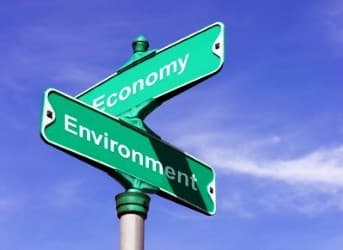Gallup has just released new poll results showing that a majority of Chinese citizens care more about cleaning up the environment than they do about growing the economy. Among Chinese adults Gallup surveyed last year, 57 percent believe that protecting the environment should be their country’s priority, even if improving environmental standards slows the pace of economic growth. Only 21 percent believe that economic growth is more important than environmental protection.
These poll results reflect a growing trend in Chinese society. As China climbs up the economic ladder, its citizens are increasingly deciding that economic growth is not enough. Being able to buy bigger houses and higher-end consumer goods is nice, but quality of life is about more than purchasing power. Real quality of life also requires good public health. In China, public health is suffering due to rampant pollution, and the citizens are desperate to change that.
Here in the United States, some anti-regulatory politicians like to claim that removing or weakening our environmental standards would make the United States a more prosperous country.
In reality, however, it doesn’t pay to be rich if you can’t be healthy too. No one knows that more than the Chinese. Ask the Chinese citizens living in cancer villages if losing their friends and relatives to cancer is a worthwhile price to pay for the dirty factory that provides jobs but poisons their villages with lead, cadmium, and other carcinogens.
Since China is not a democracy, Chinese citizens cannot vote their local politicians out of office when local governments allow businesses to emit harmful pollutants that put public health at risk. When that happens, the best option Chinese citizens have is to expose the situation through the media and hope someone in Beijing hears their story and decides to intervene.
Talking about environmental problems in China is tricky, however. Technically, the Chinese government encourages journalists to expose pollution scandals. Beijing generally finds that exposure to be useful, because it is hard for them to get accurate environmental data through official channels. They even have special transparency regulations that are supposed to give Chinese journalists access to environmental impact assessments, pollution monitoring results, and other government data.
Although Chinese leaders support exposing pollution problems in most cases, they are not okay with exposure that damages the central government’s image or sparks mass protests. They are, after all, an authoritarian regime. Because of that, they have “state secrets” regulations that make Chinese journalists liable for how citizens react to the stories they publish. If a media exposé about lead pollution sparks a protest, the journalist who wrote the story could go to jail. That means journalists have to self-sensor their environmental coverage, and citizens do not always have an outlet for exposing this information.
Environmental problems are increasingly seen as life-or-death, however. And that means many people in China are deciding they would rather risk going to jail than watch their children suffer irrevocable neurological damage from lead, mercury, and other pollutants.
When the media cannot fix their problems, Chinese citizens are increasingly taking to the streets in mass protests. We saw this in action in November 2010 when hundreds of citizens protested local government plans to build a waste incinerator near their homes in southern China’s Guangzhou City. We saw it again in December 2011 in Haimen, when Chinese citizens protested plans to build a coal plant.
Public anger is also erupting in the nation’s capital. This past winter, air pollution was so bad in Beijing, pilots could not see the runway at China’s national airport, and air traffic ground to a halt. Despite the obviously horrific conditions, Beijing’s city government rated the pollution as minor. Beijing residents flooded the internet with comments calling on their government to fess up to the fact that conditions were horrible and they were endangering public health. The citizens who posted those comments took a personal risk — any of them could have been punished for subversion, or in Chinese terminology, endangering” ‘social stability.” Since there were so many of them, however, Beijing officials were forced to side with the people and take action to address the pollution. Now Beijing is planning to close down the city’s coal plants and switch over to natural gas.
When it comes to environmental pollution, the Chinese people are getting serious. They have to — that is the only way they can protect themselves and their children from serious harm.
Here in the United States, we should do everything we can to support their cause. We should also remember that we are lucky to live in a democracy where many of these battles have already been fought and won. That is one of our greatest assets, and it is something many in China are willing to risk everything to achieve.
By. Melanie Hart
Melanie Hart is a Policy Analyst for Chinese Climate and Energy Policy at the Center for American Progress.


















